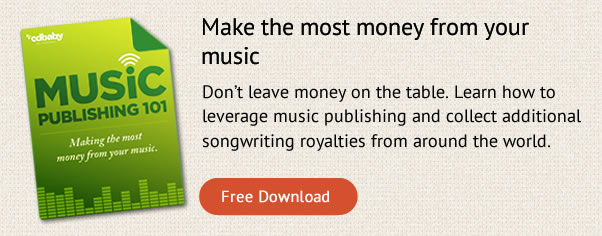 If you’re a songwriter, there are a number of different kinds of publishing royalties you can earn from the usage of your original music.
If you’re a songwriter, there are a number of different kinds of publishing royalties you can earn from the usage of your original music.
One of the big sources of publishing revenue is performance royalties, generated when your music is played on the radio, television, or in a live venue.
Another important source of income for songwriters is the mechanical royalty, generated by the reproduction of your music in mechanical or virtual form, whenever CDs are manufactured, downloads are purchased, or your songs are streamed on-demand.
Mechanical royalties and independent songwriters
Wikipedia says:
The term “mechanical” and “mechanical license” has its origins in the “piano rolls” on which music was recorded in the early part of the 20th Century. Although its concept is now primarily oriented to royalty income from sale of compact discs (CDs), its scope is wider and covers any copyrighted audio composition that is rendered mechanically; that is, without human performers.
In a nutshell: every time a song you’ve written is manufactured to be sold in a CD, downloaded on a digital music retail site, or streamed through services like Spotify and Apple Music, you are owed a mechanical royalty.
Now for the longer explanation of mechanical royalties…
As a songwriter/publisher, you are owed a royalty every time your composition is reproduced (on vinyl, tape, CD, MP3, etc). In the United States, this royalty is generally equal to 9.1 cents per reproduced “copy” of that song, depending on the length of the song, regardless of whether those albums or singles are sold.
The mechanical royalty rate for interactive, on-demand streams through services like Spotify and Apple Music is far lower than 9.1¢. But mechanical royalties for global streaming can really add up — especially because they’re generated with every LISTEN, unlike the one-time mechanical royalty generated by a download purchase or CD manufacture. In many cases, for every $100 your sound recording has generated on Spotify, there could be another $15 owed to you in (uncollected) mechanical royalties. That’s YOUR money just sitting there, and Performing Rights Organizations such as ASCAP and BMI do NOT collect mechanical royalties, which is one of the big reasons a publishing rights administrator like CD Baby Pro can be so helpful for independent artists.
[Check out “4 ways to earn money from your music on Spotify.”]
But let’s get back to mechanical royalties for CD sales and downloads for a second…
If someone covers one of your songs and they manufacture 1000 CDs — they owe you $91, regardless of whether those CDs ever get purchased by customers. If they sell 100 MP3s of your song, they owe you $9.10.
You are also owed a mechanical royalty for the sales of your music on YOUR OWN albums. But here’s where things get a little virtual; if you’re acting as your own label and putting out music that you’ve written, you’ll effectively be paying that royalty to yourself from album proceeds.
At least that’s how it works in the US, where download retailers like iTunes and Amazon pass on that mechanical royalty to you as part of the net payment for the sale of the MP3. But in many countries outside the US, mechanical royalties are set aside BY the retailer, to be paid to collection societies who then distribute those royalties to publishers and writers. A similar system is set up for the payment of mechanical royalties generated by global streaming.
BUT again, performing rights organizations like ASCAP and BMI do NOT collect mechanical royalties. Their job is to collect performance royalties, NOT mechanicals. So…
How do you collect “foreign mechanicals” generated outside the US?
In order to collect international mechanical royalties (as well as mechanicals for both global and domestic streams) on your own, you’d need to register your music with many royalty collection societies around the world.
As our friend Justin Kalifowitz of SongTrust is fond of saying, you CAN do it yourself if you really want to — but you’ll probably have to stop making music for a while. Affiliating yourself and registering your songs directly with all the international collection societies would not only take hundreds of hours of paperwork and filling out online forms, but you’d need to be proficient in dozens of languages — or hire a translator. And who wants to do that when you’ve got gigs to play?
That’s where CD Baby Pro comes in. We do all that work for you — registering songs directly with societies around the world — and then we’ll make sure you get paid ALL the publishing royalties you’re owed.
And now through April 30, 2016, use one of the codes below to save 20% on your new CD Baby Pro signup.
Single: 20PROSINGLE
Album: 20PROALBUM
Stop leaving money on the table; sign up for CD Baby Pro today!
The post Music publishing royalties explained: what is a mechanical royalty? appeared first on DIY Musician Blog.




















